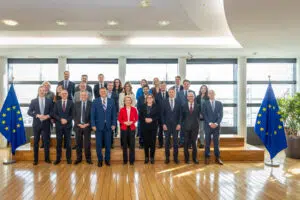Brussels – The last clean transition dialogue with European industries before the input for the 2024-2029 strategic agenda presentation is with the transport sector. “It is an incredibly important sector, as we all know. It is round about 5% of our GDP in the European Union. 10 million jobs are connected to it. And of course, it is an enormous driver of innovation,” European Commission President Ursula von der Leyen, said in her speech this morning (April 8) at the Clean Transition Dialogue for Mobility, defining the centrality of transport. However, it is the data that shed even more light on the impact of these industries on the present and future of the Union: “If we want to reach the goal of climate neutrality, we have to cut transport emissions by round about 90%. It is quite a challenge.”

As part of the dialogues with European industries, after debuting with those in the hydrogen sector and the energy-intensive ones in late 2023 and continuing with those in clean-tech and critical raw materials in February 2024, President von der Leyen and Executive Vice President responsible for the Green Deal, Maroš Šefčovič, concluded their tour with the transport sector today, two days before presenting the communication on the Clean Transition Round, as reflected in the agenda of scheduled agenda items of the College of Commissioners. “We have the tools to mitigate climate change. And one of the tools is to reduce greenhouse gas emissions. And we know that transport accounts for about a quarter of the greenhouse gas emissions here in the European Union,” von der Leyen said, reminding of the need to “work to accelerate the transition.” In this context, “the first steps have been taken, we have adopted the legislative framework in this mandate, and all of our Member States have included in their national legislation that by 2050 we will be climate neutral,” von der Leyen continued, stressing that having set this goal in law “is important for investment decisions and it is important for predictability and reliability for those who invest in a certain direction for the future.”
It is primarily the competitiveness of European industry and the expansion of clean technologies that the European Commission is looking at with interest when implementing the legislative framework. “We are writing the so-called guidelines, for tailor-made on the ground,” and with the Clean Transition Dialogues, “we need to hear from you what you need to get there, so that we can put that in our guidelines and make your life easier,” von der Leyen said. Again, the EU executive’s number one focused on the available data: “If I look at the figures from our Sustainable and Smart Mobility Strategy, until 2030 at least EUR 100 billion per year are needed for transport infrastructure investment alone.” This is about investing “massively and smartly” to be “even more resilient against even more extreme climate change,” as Brussels is already doing with “1.3 billion euros in charging and refueling infrastructure, and we are counting on leveraging this five times as much with private investment.”
Sustainable fuels, supply chains, and critical raw materials are vital for all European industries, particularly in the transport sector. For example, the Commission is “supporting 120 sustainable aviation fuels projects,” von der Leyen disclosed, recalling that sustainable fuel “a decade ago was a bad business case, but with the Green Deal it became an excellent business case, because technologies to decarbonize transport have become frontrunners in innovation in the transport sector.” For “stable and sustainable supply chains for competitiveness,” on the other hand, the focus is on “green steel, batteries, and critical components,” as seen by the work on clean steel: “When I started my mandate, we had zero projects of clean steel in the European Union. Today, we have 50, and these are 50 out of 80 worldwide,” a “very good signal” that has led to the “world’s first large-scale factory for clean steel in Sweden. As of next year, they will supply car makers with high-quality, low-carbon steel and affordable.”
And, finally, critical raw materials are a crucial issue for the entire European industrial sector. After the “bitter lesson” of dependence on Russian gas, “the next issue that we need to be particularly attentive to” is China and its strategy to gain control of the materials needed for the digital and green transition in any sector. “Over the last 20 to 30 years, China has strategically organized the whole critical raw materials scene globally so that it owns a vast majority of mines worldwide,” while the production process of some materials (such as lithium) “is practically a monopoly,” she warned. In signing contracts and MOUs with third countries, “unlike China, we tell our partners that we don’t want to take the raw materials, but help them develop the value chain locally” so that “the material stays in the country while strengthening our supply chain,” von der Leyen concluded her dialogue with representatives of European transport industries.
English version by the Translation Service of Withub



![Un campo coltivato [foto: imagoeconomica]](https://www.eunews.it/wp-content/uploads/2025/04/campo-coltivato-120x86.png)
![[foto: Wikimedia Commons]](https://www.eunews.it/wp-content/uploads/2025/04/alzheimer-120x86.png)